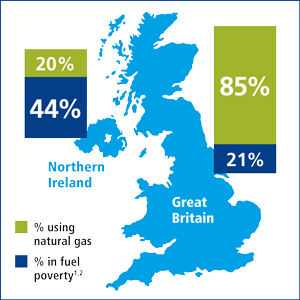The role of natural gas in tackling fuel poverty
 David Strahan, Managing Director of Phoenix Supply, argues the case for greater conversion to natural gas as the flagship policy to reduce fuel poverty.
David Strahan, Managing Director of Phoenix Supply, argues the case for greater conversion to natural gas as the flagship policy to reduce fuel poverty.
Solutions proposed to help address Northern Irelands fuel poverty problem are numerous, and often costly and complex. There is, rightly, now a greater emphasis on income maximisation, which has an important role in helping to reduce fuel poverty.
However, we ignore the role natural gas can play at our peril. It is an indisputable fact that there is a strong correlation between the number of homes using natural gas and the incidence of fuel poverty. Only in recent years has this been publicly recognised by local politicians and agencies, with greater support becoming evident for the need to displace our dependency on heating oil by making natural gas available to more households.
In Great Britain, where 85 per cent of homes use natural gas, fuel poverty rates are estimated to be around 21 per cent. Whereas in Northern Ireland, around 20 per cent of homes use natural gas and fuel poverty rates, at 44 per cent, are around twice the level in Great Britain.
The Consumer Council have identified that “the main cause of fuel poverty in Northern Ireland is our reliance on home heating oil which costs households £1,150 more per year to heat their homes than if they were using [natural] gas.”3
Fuel poverty levels will never be brought down without a fundamental step change in our energy mix. Huge strides have been made. Natural gas has so grown in popularity that it is easy to forget that just 15 years ago natural gas was unheard of as an energy source locally. While 20 per cent of households here are now using natural gas, it should be a clear objective of policy-makers to convert a further 20 per cent of homes in the next decade.
 This has the potential to lift around 100,000 homes out of fuel poverty. No other policy has the ability to deliver such a radical change to fuel poverty levels and leave a legacy that encourages investment and growth for future generations.
This has the potential to lift around 100,000 homes out of fuel poverty. No other policy has the ability to deliver such a radical change to fuel poverty levels and leave a legacy that encourages investment and growth for future generations.
So why is natural gas so attractive to policymakers in delivering immediate benefits?
• On top of price savings, many customers who convert to natural gas report energy efficiency savings of up to 40 per cent when compared to their previous heating source, partly due to the use of high efficiency boilers, appliances and modern controls;
• Natural gas has been consistently cheaper than heating oil – on average, around 20 per cent cheaper over the past year. Natural gas is also significantly cheaper than heating oil when compared over the past five or 10 year periods;
• Natural gas prices in Northern Ireland are around 6 per cent lower than the average standard tariff of the major suppliers in Great Britain and around 10 per cent lower than the standard regulated tariff in the Republic of Ireland.
Our local natural gas industry has met the challenge of establishing itself as being truly world-class. It has proved it can deliver. The question now is whether policy-makers can rise to the challenge of creating an environment where natural gas can expand further across Northern Ireland. Future generations will not forgive us if they are consigned to using heating sources long since marginalised in other regions.
David Strahan is Managing Director of Phoenix Supply Ltd and can be contacted on 028 9055 5854 or at david.strahan@phoenixsupplyni.com
Sources: 1. Northern Ireland Assembly Research and Information Service, Fuel Poverty, NIAR 411-11, 5th September 2011. 2. Economic and Social Research Institute, Fuel Poverty in Ireland: Extent, Affected Groups and Policy Issues, Working Paper No.262, November 2008. 3. Consumer Council for Northern Ireland, Decrease in Phoenix Supply Tariff is Welcome News for Belfast Gas Customers, Press Release, 23rd February 2012.





